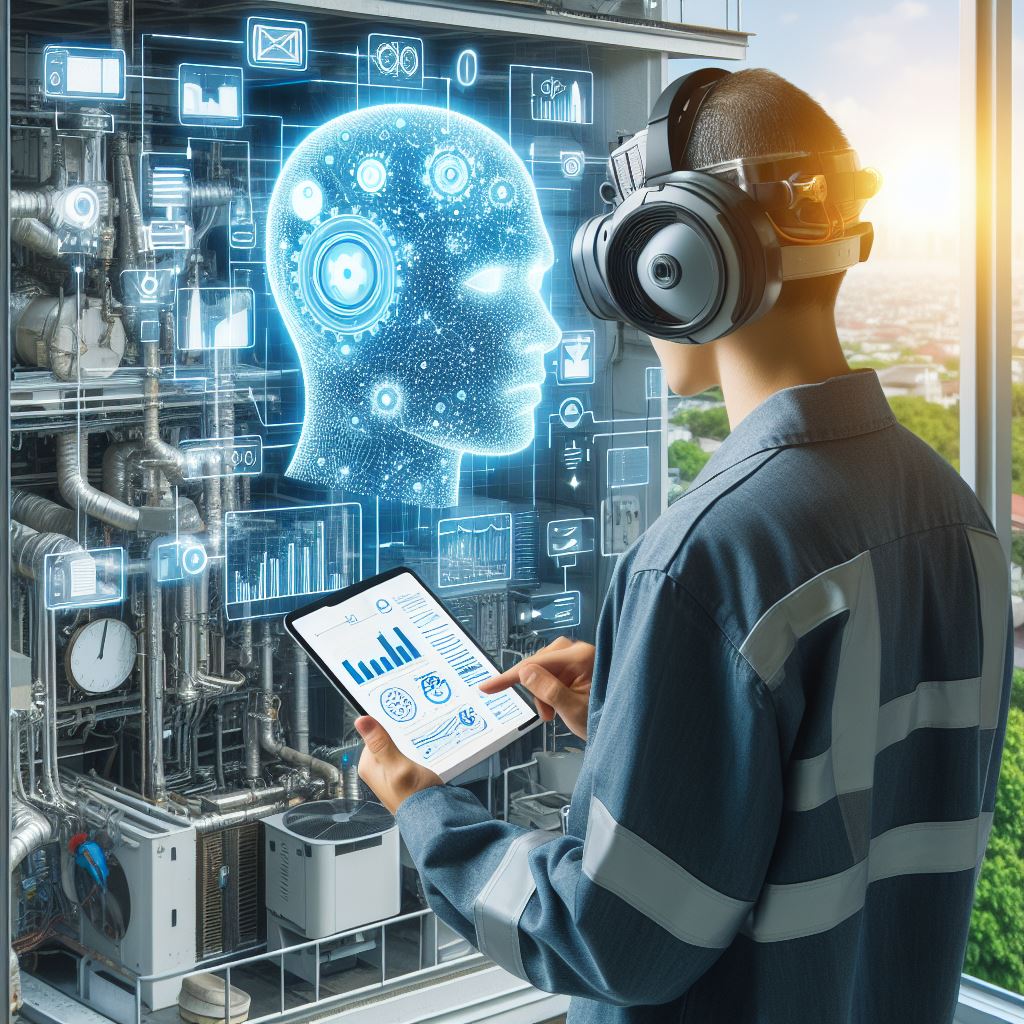In a world grappling with climate change and sustainability challenges, energy efficiency has surged to the forefront of global priorities. This urgency is particularly relevant in the realm of commercial real estate, where buildings account for a significant portion of energy consumption. Thanks to technological advancements, primarily artificial intelligence (AI), there is now a beacon of hope for a greener, more energy-efficient future.
This comprehensive exploration delves into how AI is reshaping energy management in commercial buildings, highlighting its transformative effects, examining its role in the growth of smart energy solutions, and pondering its future impact.
I. Introduction
The Rising Importance of Energy Efficiency in Commercial Buildings
The need for energy efficiency in commercial buildings is unprecedented. The U.S. Energy Information Administration reports that commercial buildings consume nearly 20% of the nation’s energy—a number that continues to grow, making it imperative to seek out methods to mitigate this substantial energy draw.
The Role of AI in Advancing Energy Efficiency
Enter AI: a suite of technologies with the power to analyze, predict, and optimize energy use with an accuracy and scale previously unattainable. AI applications range from simple predictive analytics to comprehensive energy management systems for commercial buildings, which are revolutionizing the way we think about and utilize energy.
Overview of the Blog
In the following sections, we will unpack AI’s contributions to energy efficiency, from automated systems and predictive maintenance to smart grids and the challenges faced in implementation. Finally, we will ponder the future direction of this symbiosis between AI and energy efficiency in commercial buildings.
II. Understanding AI and its Role in Energy Efficiency

Artificial intelligence (AI) is the simulation of human intelligence processes by computer systems. These processes include learning (the acquisition of information and rules for using the information), reasoning (using the rules to reach approximate or definite conclusions), and self-correction. In the context of energy efficiency, AI’s value proposition lies in its unparalleled data processing capabilities, which can identify patterns and make decisions with minimal human intervention.
For example, AI systems can digest data from thousands of sensors within a building, correlating information such as occupancy levels, weather conditions, and energy prices to make real-time adjustments to energy consumption. This level of sophisticated analysis can lead to significant savings. A study by the American Council for an Energy-Efficient Economy showed that AI could enable energy savings of up to 20% in commercial buildings.
Real-life examples of these applications abound. Google’s DeepMind AI reduced energy consumption for cooling in its data centers by a staggering 40% (as reported by DeepMind). Such case studies vividly illustrate AI’s potential in mastering energy efficiency.
III. How AI is Transforming Energy Management in Commercial Buildings
Automated Systems
Automation, the foundation of modern AI applications, refers to the technique of making a process self-operating. In commercial buildings, AI-driven automation systems manage everything from thermostats to lighting and elevators. These systems use AI algorithms to continuously adjust settings, ensuring that energy is only used when and where it is truly needed.
For instance, AI can integrate with smart HVAC systems to adjust temperatures based on real-time occupancy data, which significantly reduces heating and cooling costs—often one of the largest energy expenses in a commercial building. Siemens, for example, offers sophisticated building automation systems that leverage AI for this very purpose.
Predictive Maintenance
Predictive maintenance utilizes AI to anticipate and address potential equipment malfunctions before they disrupt operations. By analyzing data from sensors and historical maintenance records, AI models can predict when a piece of equipment is likely to fail or operates sub-optimally, prompting preemptive maintenance that can avoid energy wastage and extend the life of building infrastructure.
Energy Consumption Analysis
AI shines in its ability to thoroughly analyze energy consumption patterns. Commercial buildings can have thousands of individual energy-consuming components, and AI systems can monitor each one, suggesting optimizations that might be too complex or subtle for a human manager to recognize.
One such tool is the Building Energy Management System (BEMS), which provides comprehensive data and control over a building’s energy usage, often leading to cost reductions.
Smart Grids
Moreover, AI has implications beyond individual buildings, extending into the energy grid at large. Smart grids equipped with AI can improve how energy is distributed and consumed across cities. By analyzing data from the entire grid, AI can optimize the flow of electricity to where it’s needed most, reducing waste and integrating renewable energy sources more effectively.
IV. Case Studies of AI in Energy Efficiency
Delving into real-world applications offers concrete evidence of AI’s impact
Case Study 1
In New York City, a large commercial building implemented an AI-powered building management system. The system optimized energy use across 10,000 sensors and actuators, resulting in a 15% reduction in annual energy costs.
Case Study 2
Across the pond, a European bank with over 3,000 branches implemented AI to regulate its HVAC and lighting systems. The result was a 30% reduction in energy costs, solidifying AI’s status as a foundational tool in energy management.
V. Challenges and Considerations in Implementing AI for Energy Efficiency

Despite the advantages, there are challenges in adopting AI for energy efficiency. The initial cost of AI systems can be prohibitive for some businesses, and the technical complexity of integrating it with existing infrastructures can present additional hurdles. Moreover, the reliance on complex algorithms necessitates a discussion about data privacy and security.
However, potential solutions to these challenges exist. Incentives and rebates offered by governments and energy companies can alleviate financial burdens. Furthermore, advances in cybersecurity and data protection offer reassurance against privacy concerns.
VI. Future of AI in Commercial Building Energy Management
The future holds promising trends for AI in this arena. We can expect to see a surge in AI-integrated renewable energy systems, cutting-edge battery storage technologies, and new construction designs that incorporate AI from the ground up. All these advances will fuel the continued rise of ultra-efficient, intelligent commercial buildings.
A report by the International Energy Agency outlines the potential trajectories for digital technologies, including AI, in transforming energy systems worldwide.
VII. Conclusion
Artificial intelligence is more than a technological marvel; it’s a transformative force for energy efficiency in commercial buildings. From automation to predictive maintenance, smart grids to sophisticated energy analysis, AI is reshaping building energy management. While challenges persist, persistent innovation and commitment to sustainability will likely overcome these barriers. As the nexus between AI and energy efficiency strengthens, the forecast for commercial buildings is a brighter, more sustainable future.
In closing, embracing AI in the realm of energy management is not merely an option—it is an imperative for a world seeking to balance economic growth with environmental stewardship. The revolution is already underway, and the impact of this synergy between AI and energy efficiency will resonate for generations to come.
By embracing the power of AI, stakeholders in commercial real estate can not only achieve significant cost reductions but also contribute to the larger goal of environmental sustainability. As the technology continues to evolve, the potential for further breakthroughs in energy efficiency seems boundless, offering a shining example of how innovation can pave the way towards a smarter, cleaner future for all.
VertPro.com serves as a resourceful platform for property owners and managers seeking to enhance their buildings’ energy efficiency. The site offers a range of services, including Commercial Energy Audits, Benchmark Compliance consultancy, and a Construction Marketplace. At the heart of VertPro® is a suite of SaaS technology-based solutions designed to assist in navigating the complexities of Energy Benchmarking and Energy Audits/RCx Plus, while ensuring adherence to over 60 Energy Benchmarking and Energy Efficiency Laws across the country.
For those looking to improve their property’s energy usage and operational value, VertPro.com provides a diverse array of tools and information. The site aims to facilitate a better understanding of energy efficiency practices and legislation, helping building owners and property managers make informed decisions about their energy strategies while complying with all energy ordinances and laws.

